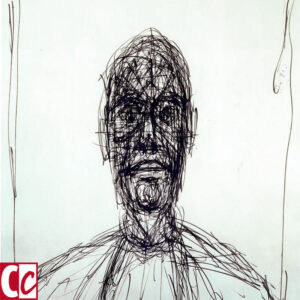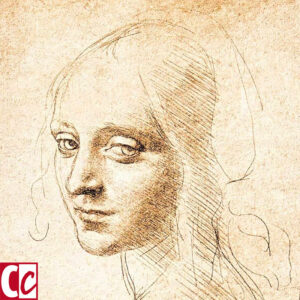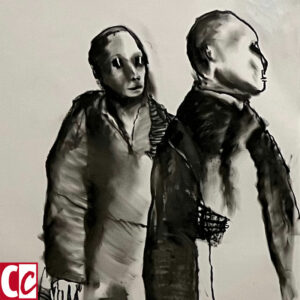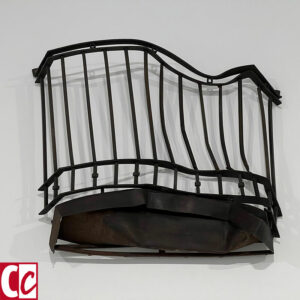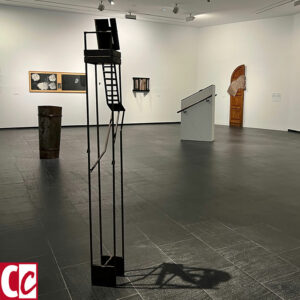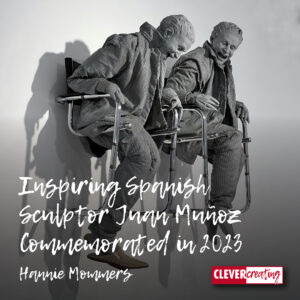
In 2023 sculptor Juan Muñoz would have turned 70. He died way too young, obviously, at the age of 48. Yet he leaves behind an impressive number of sculptures and drawings with enormous expressive power.
It is not entirely coincidental that Tom and I have seen much of his work in Spain. We are both fans!
To commemorate him, there were exhibitions of his work in various places in Spain in 2022/2023. Although the best-known of his works were on display in several of them, the exhibitions were very diverse, each with a different emphasis on a particular period.
Table of Contents
Intriguing sculptures
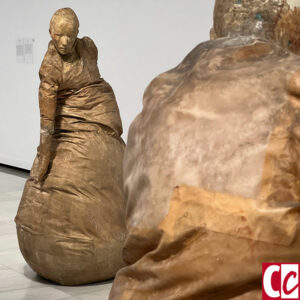
For me, Juan Muñoz’s best-known sculptures were his bronze female figures with rounded bottoms, like tumbling dolls.
I saw those for the first time in Belgium. First in Middelheim where some figures were hanging in the trees. Later we encountered a group of female figures at an art event in Mons.
The work remained in my memory, but his name did not. It only stuck after we saw an exhibition in Santander last year.
The drawing style of a sculptor
The drawings of a sculptor are very different from those of a painter. Most painters build their drawings from imaginary guidelines, sculptors seem to continue their carving in the drawings.
Just look at drawings by the sculptor Giacometti and compare them with some by Leonardo da Vinci. Intriguing!
When we happened to come across an exhibition of Munoz’s drawings in 2022, I became really enthusiastic. We usually don’t get to see a sculptor’s drawings because they are considered as just preliminary studies.
Related: Postmodern Architecture and my 3 Favourite Heroes
Why making sculptures?
- Aesthetic reasons may play a role. Auguste Rodin created vibrant, lifelike statues, while Henry Moore created abstract, aesthetic ones;
- The basic principle can be social criticism, such as the work of Ai Wei-Wei;
- The emphasis can be on form research, which was mainly what Cubists like Raymond Duchamp-Villon or Ossip Zadkine did;
- Juan Muñoz made narrative work.
An aesthetic sculptor also will conduct form research, as does a socially engaged or narrative sculptor. It’s just that the starting points are different.
Another way to consider sculpture or art in general is to look at what it represents.
- Traditional or innovative;
- Well-known themes or original work;
- Realistic or abstract;
- Conceptual.
Muñoz plays with these elements. His work seems realistic, but it is not. His use of materials is traditional, but his design language is very original.
Related: What Styles or Subjects Inspired Visual Artists in the 1960s?
Different themes
Female figures and Chinese men
In addition to the tumbling female figures, Chinese men are a well-known theme of Muñoz.
They are slightly smaller than lifelike and have no feet, which gives an alienating effect. And even when they are hung up, they smile. It seems bizarre.
Although both the tumbling women and the Chinese depict the human figure, they are not real people. They cannot walk and radiate loneliness, despite the laughter of some images.
Related: Finding Special Places of Culture and Modern Art in Madrid
Our helping tools
Railings and balconies keep us from falling. But do we really need that help, Muñoz wonders.
His railings are disappearing or contain elements that make them unsafe, such as razor blades. The balconies look rickety and are not suitable for standing on.
Permanent on display
What I have described here was to be seen in temporary exhibitions. Yet there is also permanent work both within museums and outside.
In the hall of Museo de Bellas Artes de Bilbao are 2 Chinese figures hanging from the ceiling. A more gruesome work, in my opinion.
In front of the University of Porto is a group of laughing Chinese men on benches. Jardim da Cordoaria, Porto.
If you have a chance to see any work of Juan Muñoz, I should take the opportunity.
Related: 3 Spectacular Buildings and Modern Art in Bilbao, Spain
What is your opinion on the work of Muñoz? Tell me in the comments below.

